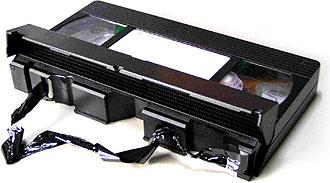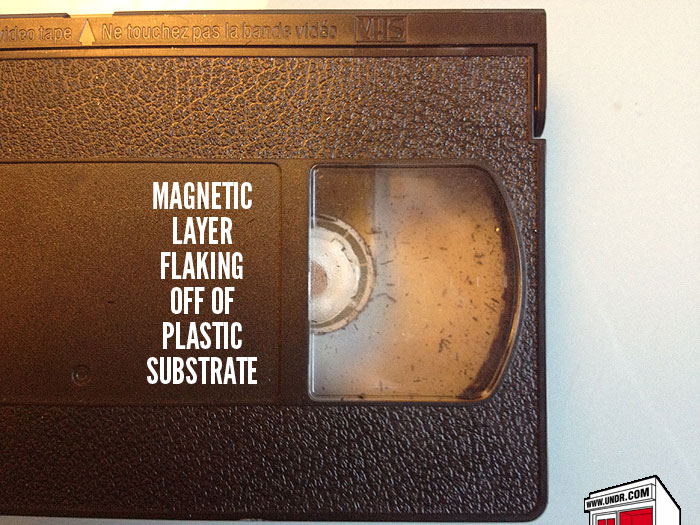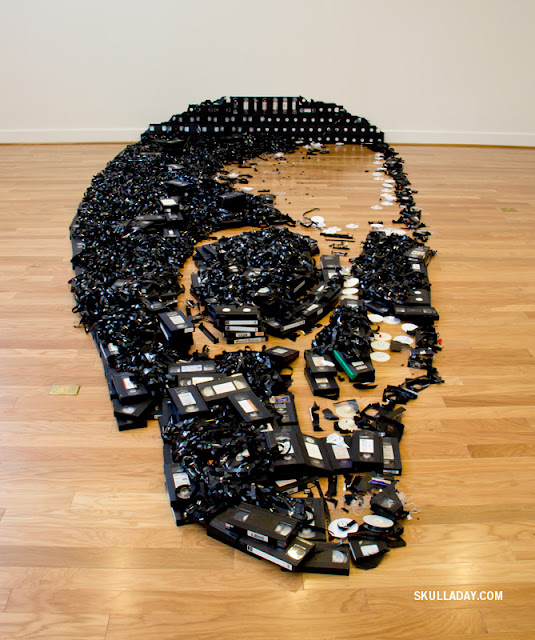In my VHS to DVD conversion business, I get to see a whole host of different video tapes every day, and I've documented a short list of sure-told signs that your aging Video tape needs to be converted to DVD in order to prolong your video memories!
This year the VHS tape is 35 years old, making it almost a grandfather compared to other since discontinued tape-based media (8-Track, DAT), yet still youthful in comparison to it's predecessor, Film, which is still in use today from it's humblest beginnings in 1826. In 2008, the last standalone VCR was made, signaling an end of the analog video recording age.
1
Broken / Stretched Video Tape

Considering the encapsulating plastic nature of the common Video formats, I'm always surprised to come across this defect. it's often blamed on a finicky VCR, but I think the blame lies more in human curiosity. There's no doubt, the magnetic plastic tape inside most common video formats is flimsy and easily damaged.
Our VHS to DVD conversion service can fix most broken media (for free!), but we'll actually trim out any stretched tape and re-splice the tape. We simply use a razor knife and scotch tape to fix any broken magnetic tapes. It's the same way they used to slice audiotapes back in the day, and it still works today. If you'd like to do this at home on your own broken video tapes, the key points to remember are simple:
- Is the Tape looped properly (no twists back to front)
- Are the both sides of the Splice equally shaped
- Use adhesive on non-magnetic side (on videotapes, this side faces inward)
- Is the resulting edited tape askew or go off axis?
Since the video signal is often written in diagonal stripes on the tape, any analog edits like this will introduce an obvious video glitch when played back, and it will affect several frames in a row. You can always expect there will be data loss and a glitch at the edit point.
2
Stop Generation Loss In Its Tracks

This is an artifact of the analog age, and it's very significant with VHS tapes! The copy is always going to look worse than the original, and there's nothing you can do to recover the lost information. From the Wikipedia's article on Generation Loss:
Generation loss refers to the loss of quality between subsequent copies or transcodes of data. Anything that reduces the quality of the representation when copying, and would cause further reduction in quality on making a copy of the copy, can be considered a form of generation loss. File size increases are a common result of generation loss, as the introduction of artifacts may actually increase the entropy of the data through each generation.
Check out this YouTube video embedded below that demonstrates how quickly VHS generation loss (23 seems to be the killer) turns this dated Roxette Music Video (images above) into a garbled jumbled mess of static and hiss.
The simple lesson is this: you should not try to 'compile' your many video memories onto one video tape, and then send that compilation video tape to be converted to DVD. You're making a bad copy of a bad copy. You're better off spending the extra money getting the originals converted. This introduces one generation loss, but you're also archiving it digitally, for perfect copies every time after that, and an end to generation loss!
3
Magnetic Substrate flaking off Plastic Tape
In a VHS tape's lifetime, this is the end of it. You can get a few more plays out of the tape, but every time the video signal is going to get worse and worse, so you need to archive what you have one last time.
Expect to see a plethora of dropouts in the form of static snow across the entire video signal (not just distortions at the top or bottom of the video frame). Below is a picture of the first signs of this problem as it looks like in a typical VHS tape. The black bits inside the tape are video information long lost to the shredder...

This tape ended up being unwatchable, as the overlaid static made it impossible to concentrate on the picture through the snow of static. Alas, it was manufactured using lower-cost materials than most brand names at the same time, as it was a cheap commercial release from a foreign nation. These factors probably contributed to the demise of this tape, but consider every tape will end up like this someday.
What Did I Miss?
Have you own digital conversion dilemma? Think I missed another sure sign of the death of video tapes? Have a bunch of videotapes you want converted to DVD inexpensively? All work done in the USA with our thoughtful attention to detail. You're sure to be impressed with the quality and speed of our service, just like many other of our customers and fans!
